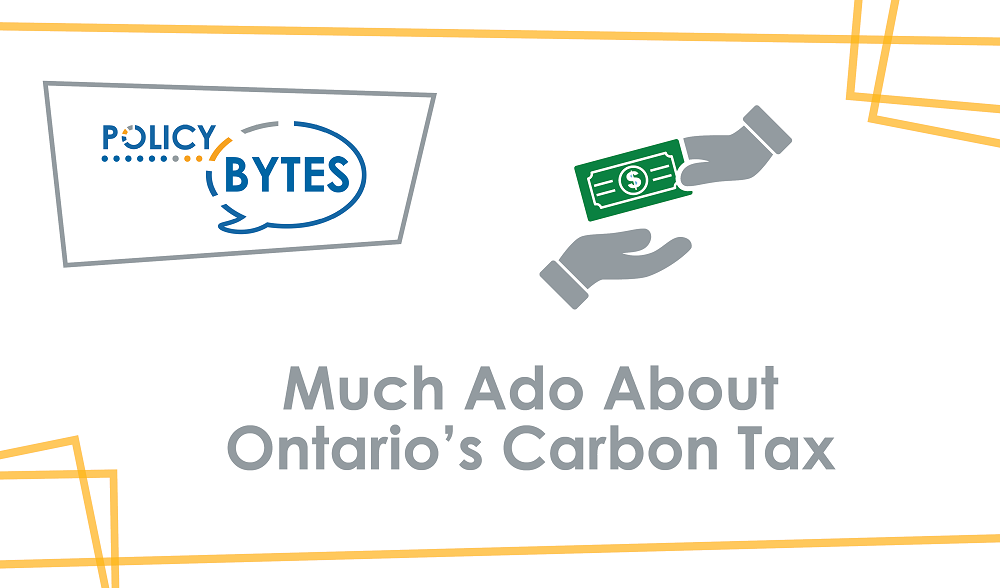Much Ado About Ontario's Carbon Tax
November 5, 2018 - Opponents of a carbon tax in Ontario, especially those holding elected office, are in a pretty sweet spot right now. Simply put, there will be a carbon tax in Ontario come the first of January 2019 and they can blame someone else for it. So, if it is a dismal failure, they win, big.

A carbon tax that jacks up government revenues and increases spending on ministerial pet projects will be a failure, let’s be clear on that. Especially if it doesn’t measurably reduce emissions, or even just reduces them by a lower amount than forecast. If those things happen, the tax will be a talking point bonanza for opponents.
If the tax works though, opponents will still have lots to fuss about. If the tax reduces emissions while also not funding pet projects and new bureaucracy (green car subsidies anyone?), it still won’t be perfect. Taxes never are. Policy never is. Everything is a compromise and that leaves even very good policy open to criticism, partisan or otherwise.
In a bold new carbon tax inclusive world, potential cash grabs by new governments and ongoing rate hikes will be two headliners in future debates. Especially since no one is absolutely sure what tax level will deliver the emission reductions we are seeking. There are also income redistribution effects to talk about: who pays the tax and how much of their income does it eat up? Who gets the benefits of reductions in taxes elsewhere to keep the overall impact “revenue neutral”?
The lack of a sunset clause can also be debated. Let’s all recall, the income tax was originally very low and temporary. If we save the planet, will we still keep paying the tax? I suspect we all know the answer to that; of course, we will. So the tax will be a political gift that keeps on giving to opponents for year to come.
If the opponents of a carbon tax are sitting pretty, politically speaking anyway, what about the proponents? Well, they are likely to be pretty happy too. The tax is coming after all, and there is probably very little that Premier Ford and his allies in other provinces can do about it. I say probably since this whole national carbon tax “backstop” is heading for the courts and, as any truly good lawyer will tell you, once you are in front of a judge it’s fifty-fifty pick ‘em every day of the week.
That said, an unpredictable judiciary isn’t the biggest hurdle on the horizon for pro-carbon tax folks. They have a much bigger challenge. Especially those sitting in Ottawa. They are the ones, after all, who have to make this thing work. Work in this context means making the carbon tax part of the landscape, a cost of doing business, a reality of being Ontarian. Like traffic in Toronto. Something people just accept, especially every four years when it comes time to vote.
British Columbia did it. By aggressively cutting other taxes, personal and corporate, and by making income contingent tax credits far richer, British Columbia got the average voter to accept a new tax. Okay, tolerate a new tax might be a better way to phrase it. But the tax has stayed, through economic and electoral cycles. That will be the true test of the success of the federal carbon tax backstop; is it still here after the next federal election, and the one after that?
Here the proponents of carbon taxation could very easily turn victory into defeat. If they set out just to avoid spending the carbon dividend, as Ontario did not do with the revenue from cap and trade, they will fail. If they do what BC has started to do and claim a slew of boutique tax credits, old and new, as carbon tax offsets (spending more time buying votes than building a green economy), they will fail.
My advice to them is to follow the early BC model. Broad income tax relief to encourage work, corporate tax relief to encourage investment, and enhanced low income credits to share the green dividend and help those most hurt by the new consumption based tax. If they follow that model the next few elections may well be fought on how many more broad tax cuts carbon revenues can fund, not whether we should have a carbon tax at all.
Charles Cirtwill is President and CEO of Northern Policy Institute. An independent social and economic think tank based in Northern Ontario with offices in Thunder Bay, Sudbury and Sault Ste. Marie. This column first appeared in Northern Ontario Business.
The content of Northern Policy Institute’s blog is for general information and use. The views expressed in this blog are those of the author and do not necessarily reflect the opinions of Northern Policy Institute, its Board of Directors or its supporters. The authors take full responsibility for the accuracy and completeness of their respective blog posts. Northern Policy Institute will not be liable for any errors or omissions in this information, nor will Northern Policy Institute be liable for any detriment caused from the display or use of this information. Any links to other websites do not imply endorsement, nor is Northern Policy Institute responsible for the content of the linked websites.
Northern Policy Institute welcomes your feedback and comments. Please keep comments to under 500 words. Any submission that uses profane, derogatory, hateful, or threatening language will not be posted. Please keep your comments on topic and relevant to the subject matter presented in the blog. If you are presenting a rebuttal or counter-argument, please provide your evidence and sources. Northern Policy Institute reserves the right to deny any comments or feedback submitted to www.northernpolicy.ca that do not adhere to these guidelines.
